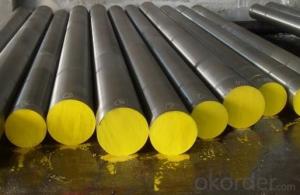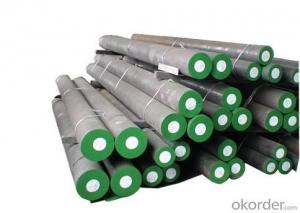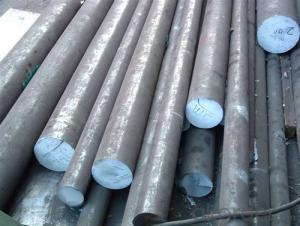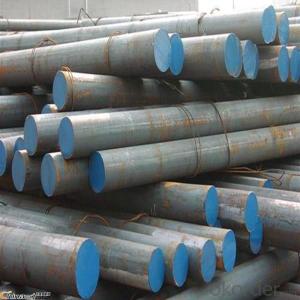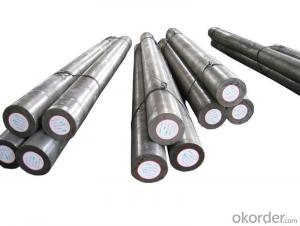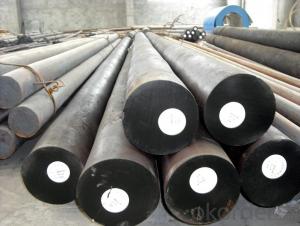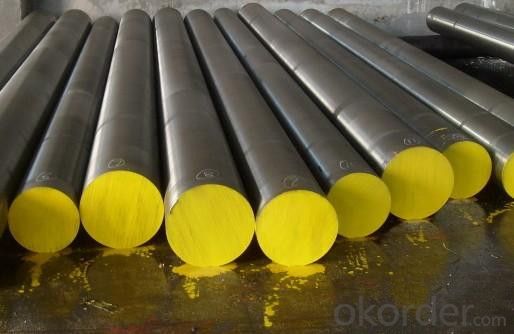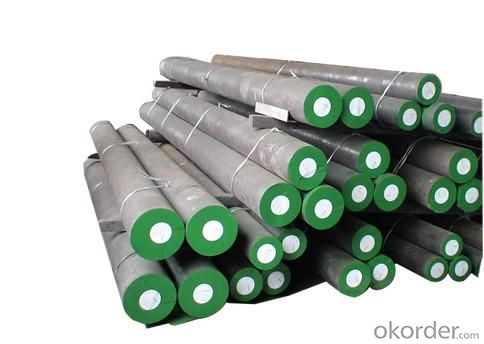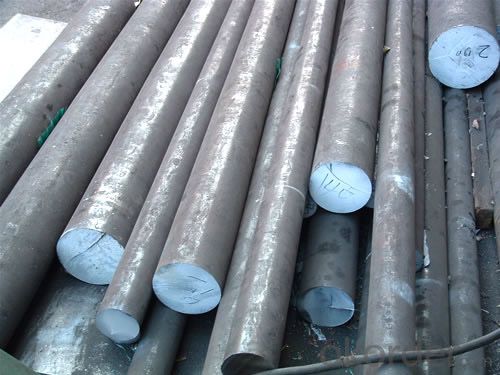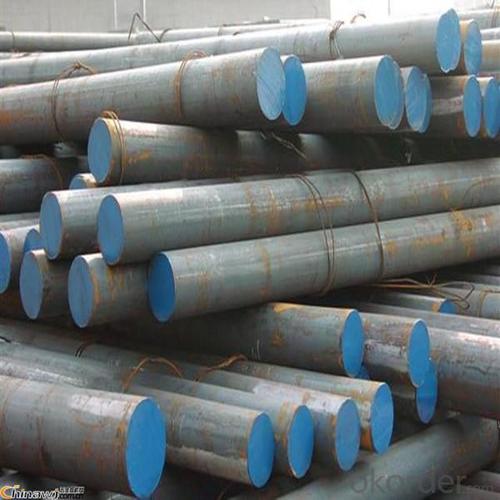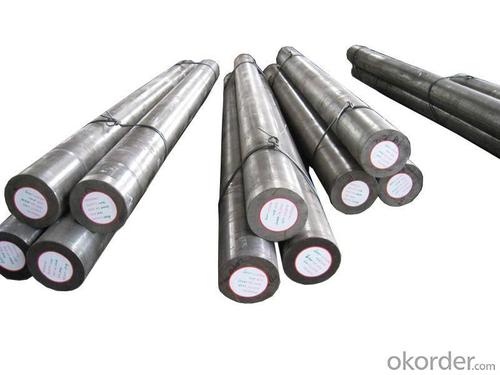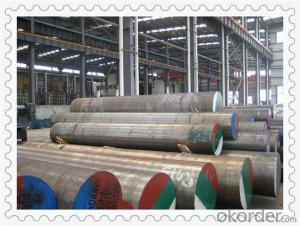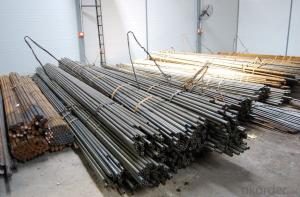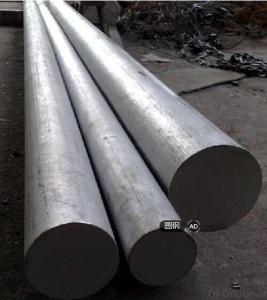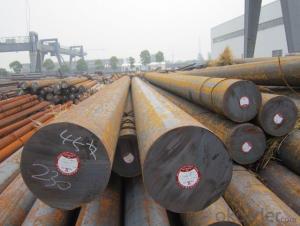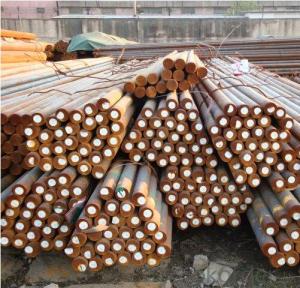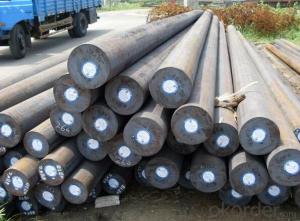Mould Steel Round Bar 1.2379
- Loading Port:
- China main port
- Payment Terms:
- TT OR LC
- Min Order Qty:
- 25 m.t.
- Supply Capability:
- 100000 m.t./month
OKorder Service Pledge
OKorder Financial Service
You Might Also Like
Specification
Mould Steel Round Bar 1.2379 / SAE 8620 Forging Round Steel Bar
Process: EAF+LF+VD+ Hot Forged+Turned(Optinal)+ Heat treatment (Optinal)
Chemical composition (%)
| Grade | C | Si | Mn | P ≤ | S ≤ | Cr | Mo | V |
| Cr12Mo1V1 | 1.40-1.60 | ≤ 0.60 | ≤ 0.60 | 0.030 | 0.030 | 11.00-13.00 | 0.70-1.20 | 0.5-1.10 |
Production Specification
Material: | forged mould steel round bar
|
Diameter: | 250mm-800mm
|
Length: | 2000mm-12000mm Straightness: 3mm/M max; square bar.150-800mm, blocks sizes up to 800*800mm
|
Process: | EAF + LF + VD +(ESR) + Forged + Heat Treatment (optional)
|
Delivery condition: | Hot forged +Rough machined (black surface after Q/T)+ Turned (optional) |
Delivery Time: | 30 days
|
MOQ: | 20 tons
|
Heat treatment: | Normalized / Annealed / Quenched / tempered |
Forged ratio: | no less than 3:1
|
Technical Data: | According to the customer's requirement of Chemical Composition, Physical Properties and Mechanical Testing; mould steel round bar available for test |
Test: | Ultrasonic test according to SEP 1921-84 G3 C/c
|
Certificate of Quality | issued in English, in addition the normal terms, production process, the mechanical property (yield strength, tensile strength, elongation and hardness), forged ratio, UT test result, Grain size, heat treatment methods and the sample of is shown on the Certificate of Quality
|
Marking: | Grade, heat NO. length will be stamped one each bar with required color
|
Payment: | 30% advance by T\T; Balance pay before the shipment against shipping documents or irrevocable LC at sight
|
Application: | Statically and dynamically stressed components for vehicles, engines and machines. For parts of larger cross-sections, crankshafts, gears. |
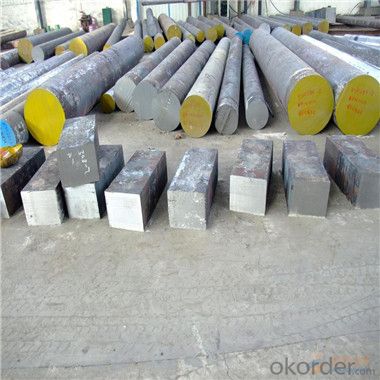
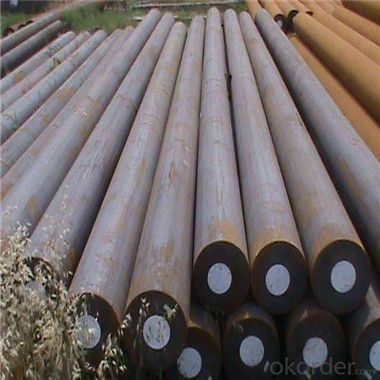
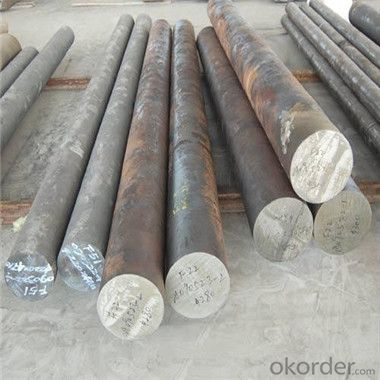
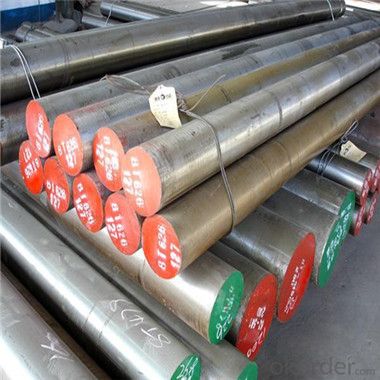
- Q: What are the advantages of using steel round bars over other materials?
- There are several advantages of using steel round bars over other materials. Firstly, steel round bars offer exceptional strength and durability, making them ideal for high-stress applications. Secondly, steel has excellent heat resistance, making it suitable for use in extreme temperature environments. Additionally, steel round bars exhibit excellent machinability, allowing for easy fabrication and customization. Moreover, steel is highly resistant to corrosion, ensuring longevity and reduced maintenance costs. Lastly, steel round bars are readily available in various sizes and grades, offering versatility for a wide range of construction and industrial projects.
- Q: How do steel round bars compare to titanium round bars?
- Steel round bars and titanium round bars possess distinct properties and characteristics that render them suitable for various applications. Below is a comparative analysis of the two: 1. Strength: In terms of strength-to-weight ratio, titanium round bars surpass steel round bars. This implies that titanium can endure larger loads and stresses while being lighter in weight compared to steel. Nevertheless, steel round bars generally exhibit greater strength and rigidity than titanium, making them ideal for heavy-duty applications necessitating high strength. 2. Resistance to Corrosion: Titanium round bars display an exceptional resistance to corrosion, even in harsh environments like saltwater. Conversely, steel is prone to corrosion and necessitates additional protective measures (e.g., coatings or galvanization) to forestall rusting. Consequently, titanium round bars are preferred in applications where corrosion resistance is vital. 3. Density: Titanium round bars possess a lower density in comparison to steel round bars. This diminished density renders titanium well-suited for applications where weight reduction is critical, such as the aerospace and automotive industries. Steel round bars, with their higher density, are typically employed in applications where weight is of less concern. 4. Resistance to Temperature: Titanium round bars exhibit excellent resistance to heat, retaining their mechanical properties even at high temperatures. Conversely, steel round bars may lose their strength and become brittle when subjected to elevated temperatures. Hence, titanium round bars are suitable for applications requiring resistance to elevated temperatures. 5. Cost: Generally, steel round bars are more cost-effective than titanium round bars. Titanium is an expensive metal due to its scarcity and intricate extraction process. The cost disparity between the two materials can be significant, making steel round bars more favorable for budget-conscious projects. In conclusion, the selection between steel round bars and titanium round bars hinges on the specific requirements of the application. Steel is preferable for its superior strength and affordability, whereas titanium offers advantages such as high strength-to-weight ratio, corrosion resistance, temperature resistance, and lower density.
- Q: What are the different types of steel round bars used in the automotive drivetrain systems?
- There are several types of steel round bars commonly used in automotive drivetrain systems, including alloy steel, carbon steel, and stainless steel. These bars are chosen based on their specific properties and characteristics, such as strength, durability, and resistance to corrosion. The selection of the type of steel round bar depends on the specific application and requirements of the drivetrain system.
- Q: How do you prevent rust on steel round bars?
- To prevent rust on steel round bars, there are several effective methods you can employ: 1. Apply a protective coating: One of the most common ways to prevent rust is by applying a protective coating such as paint, varnish, or enamel. These coatings act as a barrier, preventing moisture and oxygen from reaching the steel surface and causing rust. 2. Galvanization: Galvanizing steel round bars involves coating them with a layer of zinc. This process creates a protective barrier, as the zinc acts as a sacrificial anode, corroding instead of the steel. Galvanized steel is highly resistant to rust and is commonly used in outdoor applications. 3. Powder coating: Powder coating is another effective method of preventing rust on steel round bars. In this process, a dry powder is electrostatically applied to the steel surface, which is then cured under heat. The resulting coating provides excellent protection against rust and corrosion. 4. Regular cleaning and maintenance: Regularly cleaning your steel round bars and removing any dirt, moisture, or other corrosive substances can help prevent rust. Additionally, applying a rust inhibitor or lubricant can further protect the steel from corrosion. 5. Proper storage: Storing steel round bars in a dry and well-ventilated area can significantly reduce the risk of rust. Avoid storing them directly on the ground or in areas prone to moisture. Using pallets or racks to keep the steel elevated and properly spaced can also help prevent rust formation. 6. Avoid exposure to harsh environments: Exposing steel round bars to harsh environments, such as saltwater or acidic chemicals, significantly increases the risk of rust. If possible, try to protect the steel from prolonged exposure to these substances or consider using a more corrosion-resistant material in such conditions. By implementing these preventive measures, you can effectively reduce the likelihood of rust formation on steel round bars, ensuring their longevity and maintaining their structural integrity.
- Q: Are steel round bars suitable for bridge construction applications?
- Yes, steel round bars are commonly used in bridge construction applications. Steel round bars offer several advantages for bridge construction, including high strength, durability, and versatility. They can withstand heavy loads and provide the necessary structural support required for bridges. Additionally, steel round bars can be easily fabricated and welded, allowing for efficient construction processes. The use of steel round bars in bridge construction also ensures that the bridges are resistant to corrosion, which is particularly important in environments exposed to moisture or harsh weather conditions. Overall, steel round bars are a suitable and commonly used material in bridge construction applications due to their strength, durability, versatility, and resistance to corrosion.
- Q: What is galvanized round bar?
- A cylindrical bar of iron or steel bar that crosses a layer of zinc on its surface.
- Q: Are steel round bars suitable for marine applications?
- Yes, steel round bars are a viable option for marine applications. Steel is renowned for its robustness, endurance, and ability to withstand corrosion, making it a popular preference for a wide range of marine uses. Marine structures, such as shipbuilding, offshore platforms, and marine equipment, frequently incorporate steel round bars. The exceptional tensile strength of steel enables it to endure the harsh conditions of the marine environment, including the corrosive impact of saltwater. Moreover, steel is easily fabricated and welded, rendering it a versatile material for marine applications. Nevertheless, it is crucial to consider the specific requirements of the marine application and select the most suitable type of steel round bar. Duplex stainless steel, for instance, surpasses standard carbon steels in terms of corrosion resistance and is frequently favored for marine applications. Additionally, proper maintenance and the application of protective coatings are imperative to guarantee the longevity and performance of steel round bars in marine settings. In conclusion, steel round bars are a fitting choice for marine applications due to their strength, durability, and corrosion resistance. However, it is vital to choose the appropriate type of steel and implement adequate maintenance practices to ensure optimal performance in the marine environment.
- Q: Can steel round bars be used in the production of agricultural machinery?
- Indeed, the utilization of steel round bars is applicable in the fabrication process of agricultural machinery. Owing to their robustness, longevity, and adaptability, steel round bars are frequently employed in the creation of diverse agricultural machinery elements and constituents. These bars serve as ideal materials for constructing pivotal parts like axles, shafts, gears, and brackets, which are indispensable for the smooth functioning of agricultural machinery. It is worth noting that steel round bars can be effortlessly machined and welded to meet precise design prerequisites, rendering them an optimal selection for manufacturers involved in agricultural machinery production.
- Q: 12 of the diameter of the round steel can be M12 out of the thread is not
- No problem。 M12 coarse thread of the pitch is 1.75, the outer circle to be processed to 11.8mm, the thread of the most beautiful shape. If the outer circle is too large, the tip of the tooth is too small and very easy to deform.
- Q: Can steel round bars be used for making architectural or decorative elements?
- Certainly, steel round bars are an excellent choice for crafting architectural or decorative elements. These bars possess numerous advantages that render them perfect for such applications. To begin with, steel is an enduring and robust material, guaranteeing the longevity and stability of the architectural or decorative element. Moreover, steel round bars can be easily manipulated and personalized to fashion intricate designs, making them adaptable for various architectural styles and aesthetics. These bars can be employed to produce features such as railings, balustrades, ornamental gates, sculptures, or even pieces of furniture. Additionally, the sleek and polished surface of the steel round bars enhances their visual allure, rendering them ideal for decorative purposes. Furthermore, steel is resistant to corrosion, ensuring that the architectural or decorative element will remain intact and visually pleasing even in outdoor or high-moisture environments. In conclusion, steel round bars are a fitting and sought-after option for creating architectural or decorative elements owing to their durability, versatility, and visual appeal.
Send your message to us
Mould Steel Round Bar 1.2379
- Loading Port:
- China main port
- Payment Terms:
- TT OR LC
- Min Order Qty:
- 25 m.t.
- Supply Capability:
- 100000 m.t./month
OKorder Service Pledge
OKorder Financial Service
Similar products
Hot products
Hot Searches
Related keywords
